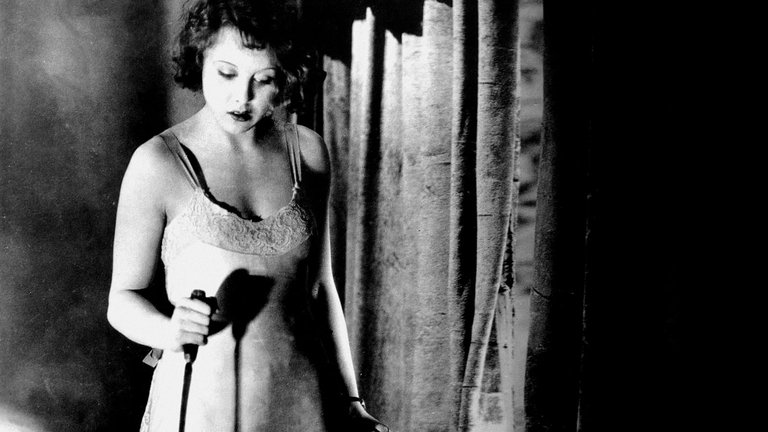Film Review: Blackmail (1929)

Thanks to the series of masterpieces made in 1950s and early 1960s Alfred Hitchcock became recognised as one of the greatest directors of all times. His place in cinema history was, however, secured much earlier with Blackmail, 1929 thriller which happened to be the first British (and non-Hollywood) sound film or “talking picture”.
The film is based on an eponymous 1928 stage play by Charles Bennett, playwright who later became a renowned British screenwriter and one of Hitchcock's collaborators. The protagonist, played by Anny Ondra, is Alice White, clerk in her family’s London tobacco shop and the plot begins on April 26th 1929 when she goes on a date with her boyfriend, Scotland Yard detective Frank Webber (played by John Longden). Two of them have a row and Alice accepts invitation from Crewe (played by Cyril Ritchard), flirty artist, to visit his studio. When Alice starts having second thought and decides to leave, Crewe tries to rape her. In the scuffle, Alice stabs him to death with a bread knife. She leaves, but among the detectives investigating murder is Frank, who quickly concludes that Alice did it, but he hides evidence in order to protect her. The problem is that the crime has been witnessed by Tracy (played by Donald Calthorp), career criminal who tries to blackmail the pair.
Blackmail was originally envisioned as silent film and, as such, it exists in two versions: a silent one for cinemas without sound technology and a better-known sound version. The latter was made relatively late during the production, with British International Pictures asking Hitchcock to add sound for the last reel. Hitchcock instead argued that it would make more sense to make version with sound in its entirety and studio agreed. This decision, due to sound technology still being new and not particularly tested, created a lot of difficulties and challenges for Hitchcock. Even the sound version at its beginning works as silent film, with only bits of sounds added and first dialogue being heard after ten minutes, sometimes with words not being properly matched with lip movements. The biggest challenge for Hitchcock was casting of popular Czech actress Anny Ondra. She would have made perfect sense in silent era, but her thick Czech accent made her sound unconvincing as London native girl. Hitchcock solved this problem by hiring English actress Joan Barry to speak Alice’s dialogue with Ondra lip-synching lines on the set, thus providing the first instance of actors’ dubbing in cinema history. Hitchcock didn’t hesitate to experiment with new technology, most notably with sound effects in a way to create suspense. Examples include bird tweeting and, more famously, scene when Alice keeps hearing word "knife" that reminds her of her crime.
The acting in Blackmail leaves something to be desired, especially in case of Ondra, although this could be explained with her still not accustomed to sound that isn’t best suited to melodramatic style typical of silent cinema. Cast playing side characters is more effective, especially Donald Calthorp as convincing and intelligent villain. Fans of period cinema, on the other hand, would probably appreciate Blackmail for giving the glimpse into late 1920s London, its Jazz Age fashion, sexual mores and, more interestingly, depiction of Scotland Yard’s Flying squad, with its radio-equipped vans, being portrayed as elite, modern and technologically advanced police force. The film also departs from many of Hitchcock’s films by having semi-ironic and morally ambiguous ending. Hitchcock fans would probably be thrilled to discover some of director’s trademarks being developed in the early part of his career – archetype of Hitchcock’s blonde, exploration of connection between sex and violence, and more notably, chase scene that ends on landmark, this time British Museum, which is effectively reconstructed with use of Schüfftan process.
Thanks to novelty of sound, Blackmail became big hit and secured Hitchcock’s career as one of top British director in 1930s, paving way for his future Hollywood glory. Despite its imperfections and being a product of its time, Blackmail remains a suspenseful thriller that could be recommended as satisfactory entertainment even to those not particularly interested in cinema history.
RATING: 7/10 (+++)
Blog in Croatian https://draxblog.com
Blog in English https://draxreview.wordpress.com/
InLeo blog https://inleo.io/@drax.leo
Hiveonboard: https://hiveonboard.com?ref=drax
Rising Star game: https://www.risingstargame.com?referrer=drax
1Inch: https://1inch.exchange/#/r/0x83823d8CCB74F828148258BB4457642124b1328e
BTC donations: 1EWxiMiP6iiG9rger3NuUSd6HByaxQWafG
ETH donations: 0xB305F144323b99e6f8b1d66f5D7DE78B498C32A7
Posted using CineTV